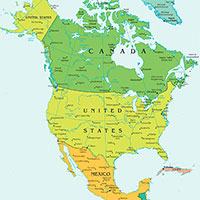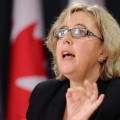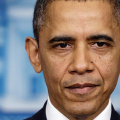Canadian Election Brings Hope for the Environment
Andres Fuentes | October 29, 2015.
After the longest election campaign in the country’s history, Canadians went to the polls on October 19 to elect a new federal government. After nine year in power, the Stephen Harper led Conservative government was defeated. Justin Trudeau led the Liberals to a victory allowing them to form a majority government. This majority came as a surprise to many who expected a closer result, with most predictions giving a minority government to either party.
The change of government brings with it the prospect, both domestically and internationally, of a more progressive approach to the environment and climate change. Under the former government, science and the environment were secondary priorities to the economic interests of the nation, including the oil sands of Alberta and their accompanying pipelines projects.
On the international stage the Harper government faced criticism for their approach to the climate change negotiations. The government was heavily criticised by foreign governments for being the only nation to pull out of its Kyoto Protocol commitment. They also undertook extensive efforts to promote the approval of the Keystone XL pipeline that would transport oil across the continent from Alberta to the Gulf of Mexico.
At home, the government failed to put in place policies to meet its previous climate commitments, preferring to focus on the goal of becoming and energy superpower.
Canada is now far from achieving its Copenhagen commitment of reducing emissions by 17 per cent from 2005 levels by 2020.
Harper’s government also faced criticisms for policies that many labeled a “war on science.” These included restricting media access to government scientist and eliminating the mandatory long-form census.
The Liberal platform included a narrative of prominent international leadership and stricter environmental stewardship. On climate change, they promised to work with the provinces and territories and to put a price on carbon.
The Liberals haven’t yet put a number on their targets for carbon reduction, instead choosing to lay out a 90-day period for establishing a “pan-Canadian framework” for battling climate change. We will see where that goes in three months’ time.
Financially, the platform committed CA$2 billion to create the Low Carbon Economy Trust, which will provide funding for projects that materially reduce carbon emissions under the proposed framework.
At the international level, the Liberal platform included a promise to invite the premier of every province and territory to join Trudeau at the UN climate negotiations in Paris. The Liberals also committed to live up to the G20 commitment to phase out fossil fuel subsidies, though the timelines are not clear.
The Trudeau platform also aims to restore trust in environmental assessments by increasing public access to the process. It will also ensure environmental assessments include an analysis of upstream impacts and greenhouse gas emissions of the projects under review.
Proposed pipeline projects are another major environmental issue in Canada. The Liberal Party supports the Keystone XL project, but Trudeau has been quoted as saying that he will not actively push for its approval by the Obama administration. The Liberals also support one of the other two major pipeline proposals; the Energy East pipeline which would allow more oil to reach Canada’s east coast. The third proposal, the Northern Gateway, has been ruled out.
Trudeau will not be officially sworn in as prime minister until November 4, but he has already begun to take action on some of his environmental commitments.
“Over the course of this day I’ve spoken with a number of Premiers and talked about our intent and engagement in regards to attending Paris together,” said Trudeau at a press conference on October 20.
“We look forward in the coming weeks to continue to engage with them and ensure that Canada demonstrates with a clear voice in Paris at the end of November that we are committed to being a positive actor doing our share to reduce global emissions.”
Canadian premiers have now agreed to attend the UN climate negotiations with Trudeau in Paris. In addition to inviting the premiers, Trudeau has also invited the leaders of the opposition parties to join him as part of the delegation.
“I will be engaging with the premiers in the coming weeks to establish a strong position for Canada, so that people know that Canada’s years of being a less than enthusiastic actor on the climate change file are behind us,” said Trudeau.
Despite the recent failure of leadership at the federal level, several provinces have undertaken local efforts to combat climate change and reduce their carbon emissions. British Columbia has implemented a much-touted carbon fee and dividend system. Ontario has recently announced that they will be putting in place a cap and trade system that will join the one established by Quebec. Ontario has also phased out all of its coal power plants, with the final plant shutting down in 2014.
While Trudeau has not mentioned any targets for greenhouse gas emissions reduction, the Canadian government committed, in May, to a 30 per cent reduction from 2005 levels by 2030. These coming months will truly test whether Trudeau can live up to his rhetoric as a climate leader.













comment